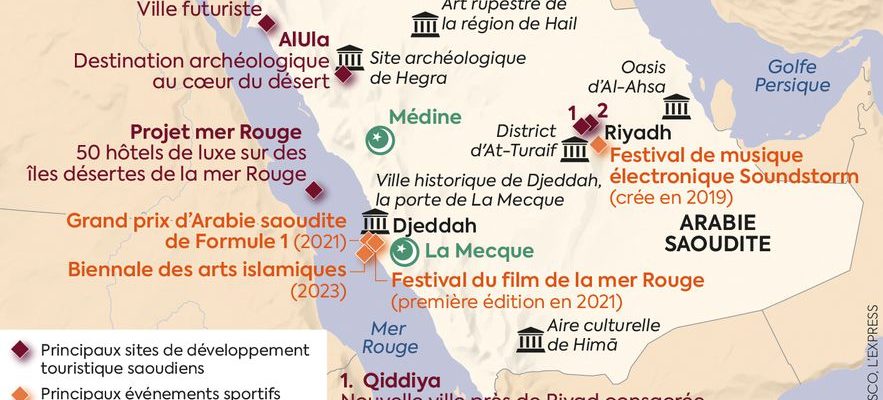Rome, Busan or Riyadh? In November, the Bureau International des Expositions (BIE), organizer of the World Expo, will reveal the name of the city that will host the 2030 edition. In the meantime, the diplomatic battle rages on. On the occasion of the General Assembly of the office, which is being held on June 20 and 21 in Paris, the competing leaders have succeeded in France. Emmanuel Macron first received Saudi Prince Mohammed bin Salman, who defends Riyadh’s candidacy. France has already pledged its support. The president then spoke with the Korean head of state Yoon Suk-Yeol, initiator of the Busan project, then with the president of the Italian Council Giorgia Meloni, who came to plead the cause of Rome.
The stakes are high. The Universal Exhibition takes place every five years and offers “a journey inside a chosen theme through engaging and immersive activities”, details the BIE. This six-month event allows the host country to receive visitors from all over the world. The Express takes stock of the reasons for this diplomatic battle.
A soft power challenge
The Universal Exhibition is first and foremost a “soft power” issue. It is an opportunity to show its power and to reassert itself on the international scene. “For six months, the host country becomes the showcase for globalization, the economy and technological advances”, analyzes for The Express Patrice Ballester, professor of geography and specialist in universal exhibitions. What give a serious advantage to States wishing to position themselves as a key player in international relations.
Starting with Saudi Arabia. “Riyadh’s candidacy is in the continuity of everything that Mohammed bin Salman does”, further explains to The Express Edouard Vasseur, historian and archivist. It participates in the “Vision 2030” program, which aims to diversify the country’s economy. In addition to the Universal Exhibition, Saudi Arabia also hopes to organize the Football World Cup and the Olympic Games. “This would allow it to assume its local geopolitical role, in competition with Qatar and Iran, and to restore its image, still very tarnished by the assassination of journalist Jamal Khashoggi”, adds Edouard Vasseur.
3742_map_saudi_arabia
© / Art Press
An economic issue
Even if it requires investment, the Universal Exhibition guarantees a revival of tourism for the host country. The economic benefits are considerable. Like the Olympics, “this is one of the events that welcomes the most visitors in the world, and over a period of six months”, notes Patrice Ballester. For example, the Milan exhibition in 2015 welcomed nearly 20 million tourists. The Dubai exhibition, postponed to 2021 due to the health crisis, recorded 24 million admissions.
The event is an ideal opportunity for the host country to consolidate its economic power. And this is partly what South Korea is trying to do, via the Busan candidacy. This port city represents “the gateway to part of Asia”, believes Patrice Ballester. And if the influence of South Korea is no longer to be proven, hosting the Universal Exhibition would be a kind of “rite of passage”, continues the geographer. “The state could officially show that it has reached the stage of a developed country, even if no one doubts it anymore.”
An architectural challenge
Another major challenge in hosting this event: town planning. As the BIE explains in its press release, countries can thus “build extraordinary pavilions and transform the host city for years to come”. It is for example to the Universal Exhibition of Paris in 1889 that we owe the Eiffel Tower.
This architectural issue is of close interest to Italy, which wishes to revitalize the Tor Vergata district in Rome. She wants to take the opportunity to create the largest photovoltaic park in the world, whose profit is estimated at 50 billion euros, reports RFI. “Italy is one of the historical host countries of the Universal Exhibition, like Belgium, France, the United States and the United Kingdom”, notes Edouard Vasseur. But will this know-how be enough to convince the BIE? In November, the 179 Member States of the organization will vote to elect the host country, according to the principle “one State, one vote”. It should be noted that the candidacy of Odessa, submitted by Ukraine before the start of the war, is no longer mentioned by the Bureau.
